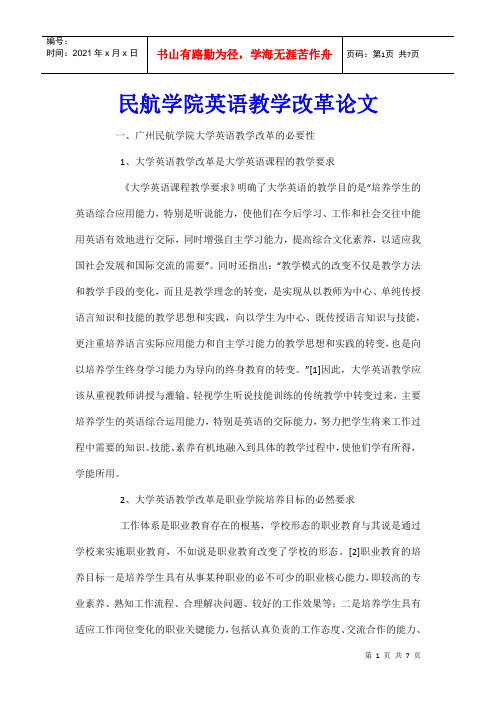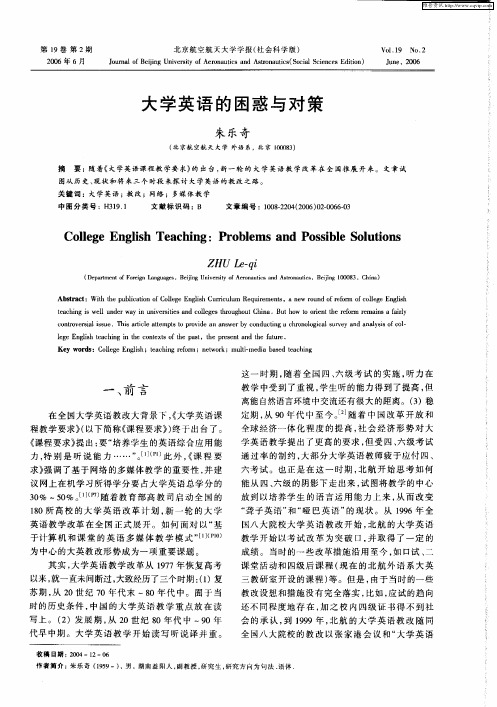北京航空航天大学大学英语教学改革构想和实施方案
- 格式:doc
- 大小:1.84 MB
- 文档页数:16

民航学院英语教学改革论文一、广州民航学院大学英语教学改革的必要性1、大学英语教学改革是大学英语课程的教学要求《大学英语课程教学要求》明确了大学英语的教学目的是“培养学生的英语综合应用能力,特别是听说能力,使他们在今后学习、工作和社会交往中能用英语有效地进行交际,同时增强自主学习能力,提高综合文化素养,以适应我国社会发展和国际交流的需要”。
同时还指出:“教学模式的改变不仅是教学方法和教学手段的变化,而且是教学理念的转变,是实现从以教师为中心、单纯传授语言知识和技能的教学思想和实践,向以学生为中心、既传授语言知识与技能,更注重培养语言实际应用能力和自主学习能力的教学思想和实践的转变,也是向以培养学生终身学习能力为导向的终身教育的转变。
”[1]因此,大学英语教学应该从重视教师讲授与灌输、轻视学生听说技能训练的传统教学中转变过来,主要培养学生的英语综合运用能力,特别是英语的交际能力,努力把学生将来工作过程中需要的知识、技能、素养有机地融入到具体的教学过程中,使他们学有所得,学能所用。
2、大学英语教学改革是职业学院培养目标的必然要求工作体系是职业教育存在的根基,学校形态的职业教育与其说是通过学校来实施职业教育,不如说是职业教育改变了学校的形态。
[2]职业教育的培养目标一是培养学生具有从事某种职业的必不可少的职业核心能力,即较高的专业素养、熟知工作流程、合理解决问题、较好的工作效果等;二是培养学生具有适应工作岗位变化的职业关键能力,包括认真负责的工作态度、交流合作的能力、心理调适能力、解决问题的能力等。
职业核心能力的强弱决定学生能否顺利就业,职业关键能力的大小决定学生在未来职业生涯中的纵深发展。
职业核心能力主要融入各门专业课的教学中,职业关键能力主要在各门公共基础课中得以贯穿。
由于行业的特殊性,广州民航职业技术学院所开设的公共基础课中,大学英语占了40%左右。
所以大学英语除了承担培养学生的语言技能之外更关注学生的人文素养、综合素质等的养成。

Vol.9No.112012年11月第9卷第11期Journal of Hubei University of Economics(Humanities and Social Sciences)湖北经济学院学报(人文社会科学版)Nov.2012一、引言通识教育是由general education 翻译得来,也有学者将它译成“一般教育”、“通才教育”等。
学者们对通识教育内涵的表述各不相同,他们从不同的视角,用不同的方法研究通识教育的概念。
李曼丽(1999:15-18)从性质、目的和内容三个角度对通识教育给出了如下定义:“就性质而言,通识教育是高等教育的组成部分,是所有大学生都应接受的非专业性教育;就其目的而言,通识教育旨在培养积极参与社会生活的、有社会责任感的、全面发展的社会的人和国家的公民;就其内容而言,通识教育是一种广泛的、非专业性的、非功利性的基本知识、技能和态度的教育”。
当今社会,人若要对社会有所贡献,甚至只是生存下去,都必须有足够的知识宽度、较强的学习能力和成熟的心智,只有终身学习才可以跟上社会发展的脚步。
授人以鱼不如授人以渔,通识教育启发心智,在高校开展通识教育的目的是培养具有健全人格的大学生,使他们对自身价值产生深入的思考和探究,能够从不同角度认识世界和体验人生,从而使他们作为负责任的公民进入社会,履行更多的责任和义务。
《大学英语课程教学要求》(教育部高等教育司2007)指出:大学英语课程“不仅是一门语言基础课程,也是拓宽知识,了解世界的素质教育课程,兼具工具性和人文性”(转引自张乐兴等,2010)。
可见,大学英语有跨学科和人文性的特点,其人才培养目标和通识教育观强调的培养全面人才的观点一致。
具体而言,大学英语既可以成为通识教育的内容,也可以充当通识教育的手段。
本文所提到的通识教育指的是外语通识教育,正如杨晓峰(2008)所述,掌握了英语就可以充分地了解不同于本民族的文化传统、行为方式和思维模式,从而引发对本民族文化的反思,最终实现全世界文化的相互融合和促进。

大学英语公共选修课的体系与操作摘要:大学英语教学改革对大学英语的课程体系提出了新的要求。
开设大学阶段的英语选修课是满足这种教学改革要求的一个有效的措施。
本文概述了国内一部分大学在这方面的实践,进而分析了英语选修课的体系与结构,然后对这种课程的开设和实施提出了若干建议。
关键词:大学英语教学改革;英语选修课;课程体系中图分类号:g64文献标识码:a 文章编号:1009-0118(2011)-01-0-02教育部高教司的《大学英语课程要求》(以下简称《要求》)明确提出,大学英语的教学目标是培养学生英语综合应用能力,特别是听说能力,使他们在今后工作和社会交往中能用英语有效地进行口头和书面的信息交流,同时增强其自主学习能力、提高综合文化素养,以适应我国经济发展和国际交流的需要。
《要求》对大学英语课程设置提出了一个全新的观念:大学英语课程应该是一个体系,而不应该只是原来那样传授给学生的一些语言技能。
它明确要求各个学校应当根据本校的实际情况,按照《要求》的精神确定本校的大学英语教学目标,并以此为基础设计自己的大学英语课程体系。
要将综合英语类、语言技能类、语言应用类、语言文化类和专业英语类等必修课程和选修课程有机结合,形成一个完整的大学英语课程体系,以确保不同层次的学生在英语应用能力方面得到充分的训练和提高。
一、国内英语选修课概述国内大学英语选修课的开展已经有一个比较长的历史。
一些高校外语院系在十多年前就已经开始这方面的尝试。
但是一些年以来,英语选修课还不被重视,也不被看作是一个体系。
近几年,这个问题开始得到改变。
国内许多高校已经正式地开始它的建设。
南京大学的外语教学实力非常强大。
该校外语部开设的英语选修课有二十多门次。
这些英语选修课主要有:高级英语阅读与英汉翻译;英语中级口译;跨文化交际与英语学习;经贸英语阅读;高级英语听力;高级英语词汇;中级美语口语;英美经济概况;高级英语写作;中高级英语视听;英文时事听力;高级英语口语;英语国家文化;加美文学和文化;美国社会与文化;高级英语听说等。
![大学英语教学改革工程及大学体验[1]](https://img.taocdn.com/s1/m/5bf451967375a417876f8f7b.png)

教育部高等教育司关于大学英语教学改革试点工作的
补充通知
文章属性
•【制定机关】教育部
•【公布日期】2003.12.22
•【文号】教高司函[2003]236号
•【施行日期】2003.12.22
•【效力等级】部门规范性文件
•【时效性】现行有效
•【主题分类】教育综合规定
正文
教育部高等教育司关于
大学英语教学改革试点工作的补充通知
(教高司函[2003]236号)
各省、自治区、直辖市教育厅(教委),有关高等学校:
根据我司《关于开展大学英语教学改革试点工作的通知》(教高司函[2003]226号)的要求,高等学校正在积极申报试点,同时也提出了一些新的问题,现通知如下:
1、根据高校的要求,在清华大学华业大厦的大学英语教学软件展示时间延长至12月31日。
2、申报参加试点的高校须在申报表中明确使用由我司委托四家出版社开发研制的某种教学软件,有关费用请与有关出版社咨询。
教育部高等教育司
二00三年十二月二十二日。

北京航空航天大学英语笔译培养计划全文共3篇示例,供读者参考篇1Beijing University of Aeronautics and Astronautics English Translation Training ProgramIntroductionBeijing University of Aeronautics and Astronautics (BUAA) is one of the leading universities in China for aeronautics and astronautics research and education. As part of its commitment to excellence in translation studies, BUAA has developed the English Translation Training Program to cultivate skilled translators in the field of aeronautics and astronautics.Program ObjectivesThe English Translation Training Program at BUAA aims to provide students with a solid foundation in both theoretical knowledge and practical skills in translation. The program is designed to equip students with the linguistic and cultural competencies necessary to translate technical documents accurately and effectively. By the end of the program, studentsare expected to have developed advanced translation skills and a deep understanding of industry-specific terminology.Program CurriculumThe English Translation Training Program at BUAA offers a comprehensive curriculum that covers a wide range of topics relevant to translation in the field of aeronautics and astronautics. Courses include translation theory, technical writing, specialized translation, and interpretation. Students also have the opportunity to gain hands-on experience through internships at leading aerospace companies.FacultyThe English Translation Training Program at BUAA is taught by a team of experienced and highly qualified professors who are experts in the field of translation studies. The faculty members are committed to providing students with the support and guidance they need to succeed in the program. Students benefit from personalized attention and mentorship from their instructors.AdmissionsAdmission to the English Translation Training Program at BUAA is highly competitive. Applicants are required to have astrong background in English language and translation studies. Prospective students must also demonstrate a genuine interest in aeronautics and astronautics. Successful applicants are selected based on their academic achievements, language proficiency, and personal qualities.Career OpportunitiesGraduates of the English Translation Training Program at BUAA are well-prepared to pursue careers as professional translators in the field of aeronautics and astronautics. They may find employment in translation agencies, aerospace companies, government organizations, and research institutions. Graduates may also choose to continue their education by pursuing advanced degrees in translation studies or related fields.ConclusionThe English Translation Training Program at Beijing University of Aeronautics and Astronautics offers students a unique opportunity to develop their skills as translators in the field of aeronautics and astronautics. By providing a rigorous curriculum, experienced faculty, and practical experience, the program equips students with the tools they need to succeed in this specialized field. Graduates of the program arewell-equipped to pursue rewarding careers in translation and make valuable contributions to the aerospace industry.Overall, the English Translation Training Program at BUAA is a valuable resource for students who are passionate about translation and interested in pursuing a career in aeronautics and astronautics.篇2Title: Beijing University of Aeronautics and Astronautics English Translation Training ProgramIntroductionBeijing University of Aeronautics and Astronautics (BUAA) offers a specialized English translation training program that caters to the needs of students interested in pursuing a career in the field of translation and interpretation. The program is designed to equip students with the necessary skills and knowledge to excel in the competitive translation market. This article will explore the various aspects of BUAA’s English translation training program, including the curriculum, faculty, and opportunities for students.CurriculumThe English translation training program at BUAA is comprehensive and covers a wide range of topics related to translation and interpretation. Students will learn about the theory and practice of translation, as well as the specific techniques and strategies required to translate different types of texts accurately and effectively. The program also includes courses on specialized areas of translation, such as legal, medical, technical, and literary translation.In addition to classroom-based learning, students will have the opportunity to participate in practical workshops and internships where they can apply their translation skills inreal-world settings. These hands-on experiences are invaluable for students looking to gain practical experience and build their portfolio of work.FacultyBUAA’s English translation training program is taught by a team of experienced and qualified faculty members who are experts in the field of translation and interpretation. The faculty members are dedicated to providing students with the support and guidance they need to succeed in their studies and future careers. They are committed to helping students develop their translation skills and foster a passion for languages and cultures.Opportunities for StudentsStudents enrolled in BUAA’s English translation training program will have access to a wide range of opportunities to enhance their learning experience. These include guest lectures by industry professionals, networking events, and study abroad programs. Students will also have the chance to participate in translation competitions and workshops to further develop their skills and gain recognition for their work.Upon completing the English translation training program at BUAA, students will be well-prepared to pursue careers in a variety of fields, including translation agencies, international organizations, government institutions, and multinational corporations. The program equips students with the skills and knowledge necessary to excel in the fast-paced and dynamic field of translation and interpretation.ConclusionBeijing University of Aeronautics and Astronautics’ English translation training program is a comprehensive and rigorous program that prepares students for successful careers in the field of translation and interpretation. The program covers a wide range of topics related to translation, including theory, practice, specialized areas, and practical experiences. With a dedicatedfaculty, abundant opportunities for students, and a focus on practical skills, BUAA’s English translation training program is an excellent choice for students looking to pursue a career in translation and interpretation.篇3Beihang University English Translation Training ProgramIntroductionBeihang University, located in Beijing, China, is a prestigious university specializing in aviation and aerospace engineering. In recent years, the university has developed a comprehensive English translation training program to meet the growing demand for professional translators in various industries. This program aims to cultivate bilingual professionals with a solid understanding of both Chinese and English languages, as well as specialized knowledge in specific fields such as science and technology, business, and humanities.CurriculumThe English translation training program at Beihang University covers a wide range of topics to equip students with the necessary skills and knowledge to become successful translators. The curriculum includes courses in translation theory,practice, and research, as well as specialized courses in areas such as engineering, finance, law, and literature. Students also have the opportunity to participate in practical training programs to gain real-world experience in translating a variety of texts, such as technical manuals, legal documents, and literary works.FacultyThe faculty members of the English translation training program at Beihang University are renowned experts in the field of translation studies, with extensive experience in both academic research and professional translation. They are dedicated to providing students with the guidance and support they need to excel in their studies and develop their translation skills. The faculty members also work closely with students to help them identify their strengths and weaknesses and provide personalized feedback to help them improve their translation abilities.FacilitiesBeihang University has state-of-the-art facilities to support the English translation training program, including a translation laboratory equipped with the latest software and technology for students to practice translating various types of texts. Theuniversity also has a translation library with a vast collection of bilingual dictionaries, reference materials, and translation tools to help students research and improve their translation skills. Additionally, students have access to online resources and databases to further enhance their translation abilities.Career OpportunitiesGraduates of the English translation training program at Beihang University are well-prepared for a wide range of career opportunities in the translation industry. They can work as professional translators in government agencies, multinational corporations, publishing houses, and international organizations, or pursue further studies in translation studies or related fields. The program also provides students with the skills and knowledge they need to work as freelance translators and start their own translation businesses.ConclusionThe English translation training program at Beihang University is a comprehensive and rigorous program designed to cultivate bilingual professionals with the skills and knowledge to succeed in the translation industry. With a strong emphasis on theory, practice, and research, this program equips students with the tools they need to excel in their careers as professionaltranslators. By providing students with a solid foundation in translation studies and practical experience in translating various types of texts, Beihang University prepares them to meet the demands of the global market and contribute to the advancement of cross-cultural communication.。
北京航空航天大学(2005)大学英语教学改革构想和实施方案一、大学英语教学改革的构想和原则1.社会背景随着80年代改革开放,英语作为国际交流的主要工作语言,促使人们开始认识到学习英语的重要性;90年代以来,随着国民英语水平的广泛提高和中国加入WTO,人们已不再满足于会读不会听、说的“聋哑”英语,要求能够自由地使用英语进行口头和书面的交流。
2.大学英语教学改革的背景为适应国家经济和社会发展的要求,84和85年分别制定和实施了理工科和文理科《大学英语教学大纲(高等院校本科用)》,并于88和89年分别开始实行全国大学英语4级和6级考试,由此进入大学英语教学的发展阶段,确立了大学英语的学科地位。
十年之后,由于社会对人才要求的提高,原国家教委在大庆会议上适时提出了大学英语要上一个新台阶的要求。
到99年,《大学英语教学大纲(高等院校本科用)[修订本]》出台和全国8大试点院校教改试点完成一轮实验,标志一个阶段的结束和一个新时期的开始。
经过3年的研究和思考,教育部指出大学英语教学目前的问题是:大学英语教学和中小学英语教学存在脱节、重复状况,致使学生对大学英语产生厌学情绪;大学英语教学对英语综合运用能力重视不够;评价和考试体系有待完善。
提出:转变思想,必须把听力和交流放在英语教学的重要位置,全面发展和提高学生听、说、读、写能力;不同类型的高校应有不同类型的英语教学大纲;加大教改力度,确立以培养实用性英语人才为重点的思想,根据学校条件逐步朝“双语教学”与大学英语教学相互补充、相互渗透,最终完全过渡到“双语教学”的方向发展。
党的16大政治报告所体现的“解放思想与实事求是的高度统一,理论创新与实践创新的高度统一,总结过去与规划未来的高度统一,立足国情与面向世界的高度统一”,应是我们当前大学英语教学改革的指导方针。
对于大学英语进行课程设计,首先要进行需求分析,了解教学对象,了解他们的起点,认真选择教学内容,根据实际教学时数,提出既有先进性又有现实性的教学目标。
大学英语教学改革方案引言在现代社会中,英语作为一门国际通用语言,对于大学生的综合素质和就业竞争力有着重要的影响。
然而,长期以来,我国大学英语教学存在诸多问题,如重视词汇和语法教学,忽视实际应用能力培养等。
为了提高大学英语教学质量,加强学生的英语语言能力和跨文化交际能力的培养,本文提出了大学英语教学改革方案。
1.目标与任务本次大学英语教学改革的目标是培养学生的英语语言能力和跨文化交际能力,使其具备独立学习和使用英语的能力,以应对未来的学习和工作需求。
具体任务包括:•优化教学内容,注重培养学生的听、说、读、写综合能力。
•引入实际应用教学,让学生能够运用英语进行真实场景下的交流和应用。
•加强跨文化交际能力培养,培养学生具备与国际交流的能力和意识。
2.教学方法与手段为了实现上述目标,我们将采取以下教学方法和手段:2.1 任务型教学法任务型教学法是一种能够将学习和实践结合起来的教学法,通过给学生一系列真实的任务,激发他们的学习兴趣和动力。
在任务型教学中,学生需要运用他们所学的知识和技能来解决问题,增强了学生的实际应用能力和学习动力。
2.2 小组合作学习小组合作学习是一种促进学生互动和合作的教学方式,通过小组合作学习,可以培养学生的表达能力、听取他人观点的能力和团队合作意识。
在英语教学中,可以通过小组合作学习进行对话练习、讨论和角色扮演等活动,提高学生的口语表达能力和跨文化交际能力。
2.3 多媒体教学多媒体教学是一种通过引入图像、声音和视频等多种媒介来增强教学效果的教学手段。
通过多媒体教学,可以提供丰富的教学资源,激发学生的学习兴趣,同时提高学生的视听能力和信息处理能力。
在英语教学中,可以通过多媒体教学来呈现英语短片、音频和图片等材料,让学生在真实的语境中感受和使用英语。
3.课程设置与内容优化为了培养学生的英语综合能力,我们将优化课程设置和内容,注重培养学生的听、说、读、写能力,并引入实际应用教学。
具体措施包括:3.1 音频听力训练通过设置音频听力训练课程,让学生接触到各种不同的英语语音和语调,提高他们的听力理解能力和语音感知能力。